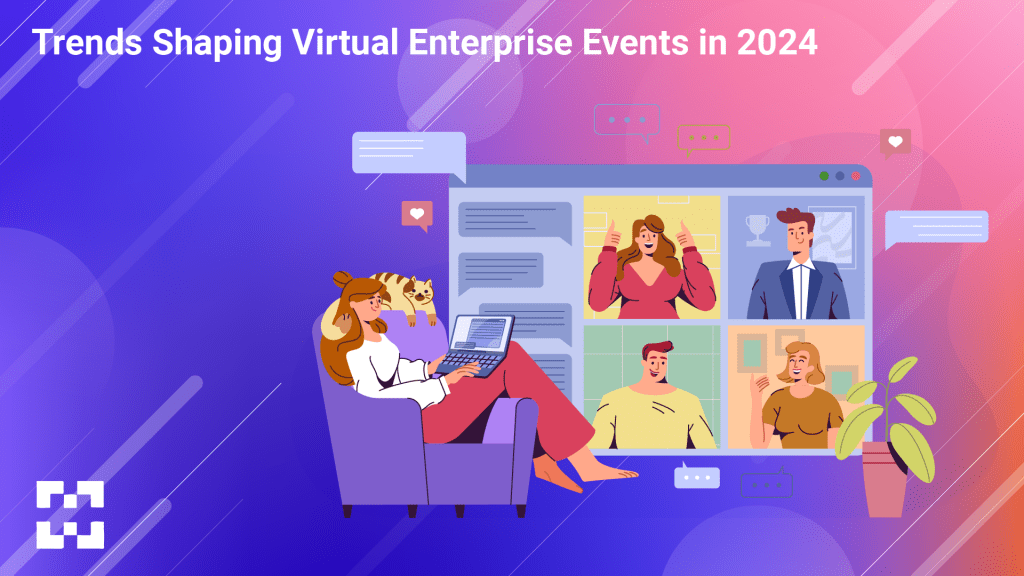
In a rapidly evolving global landscape, the way businesses operate and connect has undergone a profound transformation. One of the most significant shifts in recent years has been the rise of virtual enterprise events. These events, once considered supplementary to physical gatherings, have now become essential components of networking, collaboration, and knowledge sharing in the business world. As we delve into 2024, let’s explore the latest trends shaping virtual enterprise events and their impact on businesses worldwide.
1. Immersive Virtual Environments:
The advancement of technology has enabled the creation of immersive virtual environments that replicate the experience of physical events. From interactive 3D environments to augmented reality (AR) and virtual reality (VR) experiences, attendees can now engage in virtual enterprise events with unprecedented realism. These immersive environments not only facilitate networking and collaboration but also enhance the overall attendee experience, making interactions more meaningful and memorable.
2. Hybrid Event Models:
Hybrid event models, which combine elements of both physical and virtual experiences, have gained significant traction in recent times. This trend allows businesses to reach a broader audience while catering to diverse preferences and circumstances. Whether attendees choose to participate in person or virtually, they can engage with content, speakers, and fellow participants seamlessly. Hybrid events also offer greater flexibility, enabling organizers to adapt to changing circumstances such as travel restrictions or health concerns.
3. AI-Powered Networking and Matchmaking:
Artificial intelligence (AI) has revolutionized networking and matchmaking at virtual enterprise events. Through sophisticated algorithms, AI platforms analyze attendee profiles, preferences, and behavior to facilitate meaningful connections. From suggesting relevant contacts to organizing personalized meetings, AI-powered networking enhances the efficiency and effectiveness of virtual networking, fostering valuable relationships and collaborations among participants.
4. Enhanced Content Delivery:
Virtual enterprise events are redefining the way content is delivered and consumed. With features such as on-demand access to sessions, live streaming, and interactive workshops, attendees can engage with content at their convenience and pace. Moreover, content delivery platforms leverage analytics and feedback mechanisms to tailor content recommendations and improve future event programming, ensuring maximum relevance and impact.
5. Sustainability and Environmental Responsibility:
As businesses increasingly prioritize sustainability and environmental responsibility, virtual enterprise events offer a compelling solution to reduce carbon footprint and minimize resource consumption. By eliminating the need for travel and physical infrastructure, virtual events significantly reduce emissions and waste associated with traditional conferences. Moreover, innovative initiatives such as carbon offset programs and eco-friendly event practices further underscore the commitment of businesses to environmental stewardship.
6. Data-driven Insights and Analytics:
Data-driven insights and analytics play a crucial role in optimizing virtual enterprise events. By leveraging data analytics tools, organizers can gain valuable insights into attendee behavior, preferences, and engagement patterns. These insights inform decision-making processes, enabling organizers to refine event strategies, enhance attendee experiences, and achieve desired outcomes more effectively.
7. Enhanced Security and Privacy Measures:
In an era of increasing cybersecurity threats and privacy concerns, virtual enterprise events prioritize security and privacy measures to safeguard sensitive information and protect participants’ data. Robust encryption protocols, multi-factor authentication, and secure networking infrastructure ensure the integrity and confidentiality of virtual event platforms, instilling trust and confidence among attendees and stakeholders.
In conclusion, virtual enterprise events continue to evolve and innovate, driven by technological advancements, changing business dynamics, and evolving attendee expectations. From immersive experiences to hybrid models and AI-powered networking, these trends shape the future of business conferences and networking opportunities. By embracing these trends and leveraging virtual event technologies, businesses can unlock new opportunities for collaboration, growth, and success in an increasingly interconnected world.





